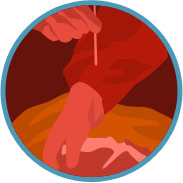Non-Traditional Treatment & Experimental Therapies
Quick Links
So far, there are treatments, but no cure for mesothelioma.
Surgery, chemotherapy and radiation therapy are the standard therapies that doctors use to arrest the spread of asbestos related cancers. Meanwhile, many clinical studies are under way to test new approaches to mesothelioma treatment and to gain better understanding of this complex disease.
A recently announced clinical study will investigate whether a person’s genes increase their risk of developing mesothelioma. Researchers will analyze the DNA of 2,000 people chronically exposed to asbestos, including 1,000 people who have developed mesothelioma and 1,000 who have not developed the disease. The study is sponsored by Wake Forest University and involves researchers from the University of Pennsylvania, Mayo Clinic, New York University School of Medicine, Johns Hopkins, Mount Sinai School of Medicine and Memorial Sloan-Kettering Cancer Center in New York.
Non-Traditional/Experimental Therapies
Researchers continue to investigate additional treatment options for mesothelioma sufferers. Clinical trials are under way to determine whether new approaches can improve the prognosis and/or relieve symptoms suffered by mesothelioma victims.
 Photodynamic therapy uses the energy from light to destroy cancer cells. It has shown promising results in treating some cancers. It is in the experimental stage for use against pleural mesothelioma and may be effective when combined with surgery.In the procedure, the patient receives a photosensitizer (a drug that makes cells sensitive to specific wavelengths of light) that collects only in cancerous cells. Once cancer cells are sensitized, fiber optic cables are placed in the body (usually through open-chest surgery) so that the correct frequency of light can be focused on the tumor. This causes the photosensitizer drug to produce a toxic oxygen molecule, which kills cancer cells.
Photodynamic therapy uses the energy from light to destroy cancer cells. It has shown promising results in treating some cancers. It is in the experimental stage for use against pleural mesothelioma and may be effective when combined with surgery.In the procedure, the patient receives a photosensitizer (a drug that makes cells sensitive to specific wavelengths of light) that collects only in cancerous cells. Once cancer cells are sensitized, fiber optic cables are placed in the body (usually through open-chest surgery) so that the correct frequency of light can be focused on the tumor. This causes the photosensitizer drug to produce a toxic oxygen molecule, which kills cancer cells.
 Gene therapy allows treatment to target tumors rather than destroy healthy cells, which is a negative effect of chemotherapy. This strategy is currently in clinical trials for the management of several cancers.Gene therapy involves altering genetic defects that allow tumors to develop. A “suicide gene” inserted directly into a tumor makes its cells sensitive to a normally ineffective drug. When the drug is administered to newly sensitive cancer cells, it destroys those cells but leaves healthy cells unharmed.
Gene therapy allows treatment to target tumors rather than destroy healthy cells, which is a negative effect of chemotherapy. This strategy is currently in clinical trials for the management of several cancers.Gene therapy involves altering genetic defects that allow tumors to develop. A “suicide gene” inserted directly into a tumor makes its cells sensitive to a normally ineffective drug. When the drug is administered to newly sensitive cancer cells, it destroys those cells but leaves healthy cells unharmed.
 Immunotherapy (or “biological therapy”) treats cancer by using the body’s own immune system to fight cancer cells. This therapy is also known as biological response modifiers, or BRMs. Immunotherapy consists mainly of using biological agents as tumor vaccines to stimulate the immune system to fight cancer cells. Although immunotherapy is not yet obtainable, promising clinical studies are under way.
Immunotherapy (or “biological therapy”) treats cancer by using the body’s own immune system to fight cancer cells. This therapy is also known as biological response modifiers, or BRMs. Immunotherapy consists mainly of using biological agents as tumor vaccines to stimulate the immune system to fight cancer cells. Although immunotherapy is not yet obtainable, promising clinical studies are under way.


